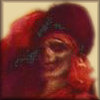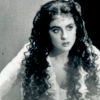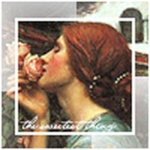The Angel of the Opera by Sam Siciliano
+6
Scorp
TheMaskedLion
Riene
Raphael
LadyCDaae
HDKingsbury
10 posters
Page 1 of 1
 The Angel of the Opera by Sam Siciliano
The Angel of the Opera by Sam Siciliano
The Angel of the Opera
By Sam Siciliano

I was given the book for my birthday back in 1995, and it has long been one of my favorites. It is a story that combines two of my favorite literary characters -- Sherlock Holmes and The Phantom of the Opera.
In The Angel of the Opera, we have an Erik who is very much to my liking – not a monster, but a lonely, anguished man who has been shunned by society and who sees in Christine Daaé his last chance at love. Towards the end of the book, Erik puts it quite well when he says, “There are men who can live alone without the society, the intimacy, of women, but I am not such a man. Knowing Christine has made it far worse. I thought, I truly thought, that she might love me. I can bear my dreadful solitude no longer.” How can you not feel for the man?
This story follows Leroux’s original somewhat closely with some necessary changes made to include Holmes and his cousin, Henry Vernier. No, there’s no Watson in this one. Mr. Siciliano wanted to give us a more human Holmes than the thinking machine created by Doyle. To do that, he needed to change narrators. He did this by giving us Dr. Henry Vernier, who tells us that Watson’s portrayal of Holmes was not quite accurate and that the detective and the doctor did not always exist on the best of terms.
In fact, the reason it is Vernier who accompanies Holmes to Paris is that his cousin and Watson have had a falling out at this time. There may be some readers who consider this “Watson bashing,” but I don’t. To me, bashing is unreasonably insulting a person or a character. What we have here, and in a lot of fan fiction, is what I think of as reinterpreting of a character. Sometimes that reinterpretation can devolve into bashing, but in this case, I don’t think so. However, back to the story.
The author is well versed in both Holmes and Phantom, and his research shows up in the careful details he has included in his story. One of the first clues that Siciliano knows his Holmes is when he calls a relative Violet Sherrinford. Students of The Great Detective will recognize the name of Sherrinford as that purported to be the name of Holmes’s father. And, of course, Violet is a common name throughout the Doyle stories.
As for the world of PotO, the author's detailed descriptions of the opera house and its workings are in depth and necessary for understanding events as they later unfold. He also has knowledge of Brittany, and his inclusion of standing stones near Perros is not something just thrown in for the heck of it. In my own research of Perros and Brittany, I learned that there are many remnants of the regions Celtic past including standing stones.
Essentially, the story involves Holmes being called to Paris by the management of the Paris Opera. While there, Holmes makes the acquaintance of PotO’s characters. Christine Daaé is a confused young woman who not all that long ago believed in the korrigans (pixie-like people). Raoul de Chagny is a sometime arrogant young man who can be rather full of himself, while Count Philippe is always arrogant. The others are all there, too – Meg Giry, Mme Giry, the Persian (who is portrayed in a less than stellar light), and other minor characters.
There is another character we meet only at the end of the book, but who is alluded to throughout the story – the love of the narrator’s (Vernier’s) life, a woman named Michelle. Vernier’s observances of the behavior of Christine and Raoul serves as an interesting counterpoint to his own feelings for Michelle, like in a piece of music where two different themes are played at the same time yet compliment each other rather than detract.
Holmes and Erik have several excellent conversations. My favorite is at the masked ball. You know, Red Death and all that stuff. Holmes attends, dressed as Quasimodo. (The parallels between Quasimodo’s presence in the Notre Dame Cathedral and Erik’s in the Paris Opera is brought out several times.) Here is a sample from that exchange:
The Red Death smiled, an expression that made him look even more ghastly. “You are amusing, Quasimodo, most amusing, but I do not believe you. Your face is mostly putty.”
“Your own face blinds you. It is no more real than mine. No faces are real; they are all illusion, constantly changing, all masks. It is foolish to envy another his mask. A mask has no more permanence or reality than anything else in this life.”
The Red Death stared at Holmes, his eyes aflame. “You would not find that so easy to say if you were to trade places with me, if you had a face even a mother would cringe before.” A strange, pained smile pulled at his mouth.
“I know that. However, although it is something of a cliché, that which lies under the mask is what counts. Too many fools and villains have the visage of Jove or Adonis.”
“All the more reason to hate this life, this face, which Fate has bestowed upon me.”
I could go on, but you get the picture.
As for the framing story. In the beginning of the book, we find Holmes and Vernier finishing up a case in Wales, in the home of Major Lowell and his daughter, Susan. Lowell spent many years in India, and married an Indian woman. Susan is the product of that union, and is shunned by society because of her half-caste status. She also suffers from trachoma, which she contracted in India and which has left her mostly blind.
You may be able to see where this is leading, and while some readers have suggested that the ending of this book is clichéd, I found it satisfying nonetheless. Clichés would not exist if there were no universal truth behind them. Besides, like so many of us, I wanted Erik to find some happiness.
By Sam Siciliano

I was given the book for my birthday back in 1995, and it has long been one of my favorites. It is a story that combines two of my favorite literary characters -- Sherlock Holmes and The Phantom of the Opera.
In The Angel of the Opera, we have an Erik who is very much to my liking – not a monster, but a lonely, anguished man who has been shunned by society and who sees in Christine Daaé his last chance at love. Towards the end of the book, Erik puts it quite well when he says, “There are men who can live alone without the society, the intimacy, of women, but I am not such a man. Knowing Christine has made it far worse. I thought, I truly thought, that she might love me. I can bear my dreadful solitude no longer.” How can you not feel for the man?
This story follows Leroux’s original somewhat closely with some necessary changes made to include Holmes and his cousin, Henry Vernier. No, there’s no Watson in this one. Mr. Siciliano wanted to give us a more human Holmes than the thinking machine created by Doyle. To do that, he needed to change narrators. He did this by giving us Dr. Henry Vernier, who tells us that Watson’s portrayal of Holmes was not quite accurate and that the detective and the doctor did not always exist on the best of terms.
In fact, the reason it is Vernier who accompanies Holmes to Paris is that his cousin and Watson have had a falling out at this time. There may be some readers who consider this “Watson bashing,” but I don’t. To me, bashing is unreasonably insulting a person or a character. What we have here, and in a lot of fan fiction, is what I think of as reinterpreting of a character. Sometimes that reinterpretation can devolve into bashing, but in this case, I don’t think so. However, back to the story.
The author is well versed in both Holmes and Phantom, and his research shows up in the careful details he has included in his story. One of the first clues that Siciliano knows his Holmes is when he calls a relative Violet Sherrinford. Students of The Great Detective will recognize the name of Sherrinford as that purported to be the name of Holmes’s father. And, of course, Violet is a common name throughout the Doyle stories.
As for the world of PotO, the author's detailed descriptions of the opera house and its workings are in depth and necessary for understanding events as they later unfold. He also has knowledge of Brittany, and his inclusion of standing stones near Perros is not something just thrown in for the heck of it. In my own research of Perros and Brittany, I learned that there are many remnants of the regions Celtic past including standing stones.
Essentially, the story involves Holmes being called to Paris by the management of the Paris Opera. While there, Holmes makes the acquaintance of PotO’s characters. Christine Daaé is a confused young woman who not all that long ago believed in the korrigans (pixie-like people). Raoul de Chagny is a sometime arrogant young man who can be rather full of himself, while Count Philippe is always arrogant. The others are all there, too – Meg Giry, Mme Giry, the Persian (who is portrayed in a less than stellar light), and other minor characters.
There is another character we meet only at the end of the book, but who is alluded to throughout the story – the love of the narrator’s (Vernier’s) life, a woman named Michelle. Vernier’s observances of the behavior of Christine and Raoul serves as an interesting counterpoint to his own feelings for Michelle, like in a piece of music where two different themes are played at the same time yet compliment each other rather than detract.
Holmes and Erik have several excellent conversations. My favorite is at the masked ball. You know, Red Death and all that stuff. Holmes attends, dressed as Quasimodo. (The parallels between Quasimodo’s presence in the Notre Dame Cathedral and Erik’s in the Paris Opera is brought out several times.) Here is a sample from that exchange:
The Red Death smiled, an expression that made him look even more ghastly. “You are amusing, Quasimodo, most amusing, but I do not believe you. Your face is mostly putty.”
“Your own face blinds you. It is no more real than mine. No faces are real; they are all illusion, constantly changing, all masks. It is foolish to envy another his mask. A mask has no more permanence or reality than anything else in this life.”
The Red Death stared at Holmes, his eyes aflame. “You would not find that so easy to say if you were to trade places with me, if you had a face even a mother would cringe before.” A strange, pained smile pulled at his mouth.
“I know that. However, although it is something of a cliché, that which lies under the mask is what counts. Too many fools and villains have the visage of Jove or Adonis.”
“All the more reason to hate this life, this face, which Fate has bestowed upon me.”
I could go on, but you get the picture.
As for the framing story. In the beginning of the book, we find Holmes and Vernier finishing up a case in Wales, in the home of Major Lowell and his daughter, Susan. Lowell spent many years in India, and married an Indian woman. Susan is the product of that union, and is shunned by society because of her half-caste status. She also suffers from trachoma, which she contracted in India and which has left her mostly blind.
You may be able to see where this is leading, and while some readers have suggested that the ending of this book is clichéd, I found it satisfying nonetheless. Clichés would not exist if there were no universal truth behind them. Besides, like so many of us, I wanted Erik to find some happiness.

HDKingsbury- Posts : 128
Join date : 2009-09-29
Age : 124
Location : Ohio
 Re: The Angel of the Opera by Sam Siciliano
Re: The Angel of the Opera by Sam Siciliano
I didn't much care for Siciliano's interpretation of Christine and Raoul in this, or his ending, but as you pointed out the Holmes/Erik interplay is absolutely perfect--two brilliant, eccentric men matching wits. Worth a read.
~LCD
~LCD
 Re: The Angel of the Opera by Sam Siciliano
Re: The Angel of the Opera by Sam Siciliano
I know what you mean about not caring for the characterizations of D & R. That's a sore point with some other phans I know as well. Me? I didn't mind it, but maybe that's because I was so drawn in by the Holmes/Erik interplay. 

HDKingsbury- Posts : 128
Join date : 2009-09-29
Age : 124
Location : Ohio
 Re: The Angel of the Opera by Sam Siciliano
Re: The Angel of the Opera by Sam Siciliano
I love the concept of a Holmes/Phantom crossover (which is probably why I also like the "Tales of the Shadowmen" anthology series that crosses all sorts of literary characters together). This very much read like a Holmes novel about the events in the Paris Opera, meaning the characters of Christine, Raoul, Philippe, The Persian, etc. felt like your typical characters in a Holmes story. I had some quibbles with that, but enjoyed the book nonetheless.
R.
R.
 Re: The Angel of the Opera by Sam Siciliano
Re: The Angel of the Opera by Sam Siciliano
Yes, this is definitely more Holmes than Phantom, but that's okay. I love Sherlock, too. For a long time now, I've had this idea for a fic that is a Phantom/Holmesian crossover. Of course, died-in-the-wool romantic that I am, mine would end up being E/C! 

HDKingsbury- Posts : 128
Join date : 2009-09-29
Age : 124
Location : Ohio
 Re: The Angel of the Opera by Sam Siciliano
Re: The Angel of the Opera by Sam Siciliano
If you ever write a Holmes/Phantom crossover phic, HDK, I would like to read it. 
I have this book as well but don't remember much about it. Must go re-read it, too.
I have this book as well but don't remember much about it. Must go re-read it, too.
 Re: The Angel of the Opera by Sam Siciliano
Re: The Angel of the Opera by Sam Siciliano
Thanks, Riene. I've held back on writing the story (even though I have the plot all sketched out) because -- if you can believe this -- I'm afraid of not getting Holmes right! (Images of Jeremy Brett dance around in my head!)

HDKingsbury- Posts : 128
Join date : 2009-09-29
Age : 124
Location : Ohio
 Re: The Angel of the Opera by Sam Siciliano
Re: The Angel of the Opera by Sam Siciliano
What have we here...another Brett fan? I spent this afternoon tidying up my closet. To keep me company, I popped in one of my Brett/Holmes DVDs. A very nice way to help make a necessary chore a little more pleasant. 

HDKingsbury- Posts : 128
Join date : 2009-09-29
Age : 124
Location : Ohio
 Re: The Angel of the Opera by Sam Siciliano
Re: The Angel of the Opera by Sam Siciliano
I adored this book and I read it quite often.

TheMaskedLion- Posts : 73
Join date : 2009-09-23
Age : 36
Location : Brisbane
 Re: The Angel of the Opera by Sam Siciliano
Re: The Angel of the Opera by Sam Siciliano
Back in the day (as in yonks ago, before the Internet took off) this was the only non-Leroux and non-Kay piece of Phantom fiction that I'd heard of, but I could never find it. With all the current Sherlock Holmes mania, am thinking of checking it out (not a Holmes fan per se in that I've never got into them). Is this worth my money? (Think of me as someone who would rather watch Joel Schumacher's and Dario Argento's movies over and over again for the rest of life than read typical fan fiction...but I am assured by this as to my knowledge this wasn't self-published and Sam Siciliano is a professional writer). Me reckons it would have been something (well, the idea anyway, I know nothing about how Siciliano has executed it) Leroux would have been interested in; he was a Holmes fan.
Opinions in this thread seem positive, but just wanted to double check first... Have to say I'm intrigued by the comments that Siciliano seems to have researched the Paris Opera and Perros-Guirec well.
Opinions in this thread seem positive, but just wanted to double check first... Have to say I'm intrigued by the comments that Siciliano seems to have researched the Paris Opera and Perros-Guirec well.
 Re: The Angel of the Opera by Sam Siciliano
Re: The Angel of the Opera by Sam Siciliano
Ha-ha! Agreed...Scorp wrote:(Think of me as someone who would rather watch Joel Schumacher's and Dario Argento's movies over and over again for the rest of life than read typical fan fiction...)
 Re: The Angel of the Opera by Sam Siciliano
Re: The Angel of the Opera by Sam Siciliano
HDKingsbury wrote:What have we here...another Brett fan?
*raises hand* Here's another one!
Anyhow, Scorp, I definitely think it's a book worth tracking down if you can find it at a reasonable price (which seems to have become increasingly difficult these days). While the ending is indeed cliched, the book is not terrible by far. Are there some questionable choices made with the behaviors of certain canon characters? Yes. Is the narrator of the story (who by the way, bashes Watson's writing and medical abilities) annoying at times? Yes.
Those flaws aside I agree that the intellectual fencing match between Erik and Holmes is entertaining and Holmes clearly displays a great respect for his masked 'foe'.
~Madame~

Madame Giry- Posts : 502
Join date : 2009-11-22
Location : United States
 Re: The Angel of the Opera by Sam Siciliano
Re: The Angel of the Opera by Sam Siciliano
After all these years, it looks like this book is finally back in print: http://www.amazon.co.uk/Further-Adventures-Sherlock-Holmes-Angel/dp/1848568614/ref=sr_1_107?s=books&ie=UTF8&qid=1300824391&sr=1-107
 Re: The Angel of the Opera by Sam Siciliano
Re: The Angel of the Opera by Sam Siciliano
I love Jeremy Brett! I became a fan of him last year when my Birthday present was the complete Granada set of his Sherlock Holmes episodes. Won me over instantly. Loved his portrayal.

ML6- Posts : 873
Join date : 2009-10-28
Age : 36
Location : USA
 Re: The Angel of the Opera by Sam Siciliano
Re: The Angel of the Opera by Sam Siciliano
Sounds a good - maybe not great but good - book. My sister is Holmes fan (especially Doyle´s and Brett´s, that is) and she really liked ALW musical and 2004 movie.

RoseOfTransylvania- Posts : 59
Join date : 2011-01-27
Age : 53
Location : Land beyond the forest
 Re: The Angel of the Opera by Sam Siciliano
Re: The Angel of the Opera by Sam Siciliano
I was fortunate enough to get my hands on a first edition back in the day. Feels more like the Phantom characters in Holmes' world than the other way around, but I love the mash-up concept too much to fault it.
R.
R.
 Similar topics
Similar topics» Qoutes from Magazine & Newspaper Articles
» Phantom Cat of the Opera
» Angel of Music
» Angel of Music, by Carrie Hernandez
» Lego of The Opera!
» Phantom Cat of the Opera
» Angel of Music
» Angel of Music, by Carrie Hernandez
» Lego of The Opera!
Page 1 of 1
Permissions in this forum:
You cannot reply to topics in this forum
